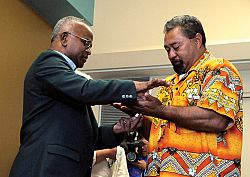Deacon Otto Johansson completes chaplaincy training

SALT LAKE CITY — Over the past year, Deacon Otto Johansson has read 3,000 pages of clinical data and written 500 pages of the same, attended four hours of class each week and spent 1,600 hours visiting patients. On July 28, all that work paid off: Deacon Otto was among the 15 people of various faiths to receive Clinical Pastoral Education certification during a ceremony at the George E. Wahlen Department of Veterans Affairs Medical Center in Salt Lake City. "Otto brings a variety of skills" to the chaplaincy, said Chaplain Mark L. Allison, supervisor of the Clinical Chaplain Training program. "I am confident that Otto can go into anybody's home or hospital room and provide competent compassion and counseling to that Catholic parishioner or people of other faith traditions. He brings his Polynesian love; he's passionate and is motivated and is dedicated." Deacon Otto's classmates came from a variety of faith traditions: Non-denominational, Episcopal, Jewish, Church of Jesus Christ of Latter-day Saints, Nazarene and Native American. Those in the training program serve in numerous hospitals throughout the Wasatch Range, as well as in hospices, jails, convalescent centers and rehabilitation facilities, Allison said. "They're out there doing ministry to a variety of people in an interfaith way. They each bring their own tradition, whether Lutheran or Roman Catholic or LDS, and so they minister to their own, but they also facilitate for everybody else with their healing presence and provide a listening ear and encouragement to anybody and everybody." The program began in Salt Lake City in 2007; since then, dozens of people have graduated and now serve as chaplains in hospitals and hospices, for the military and for law enforcement. "We have witnessed miracles; we have experienced the hand of the Almighty blessing people in dire situations," Allison said. "I see the hand of God blessing these interfaith chaplains who go out and bless the lives of people." Being a chaplain "is about unwrapping people from their cognitive, from their emotional, from their relational and behavioral bandages," said the Rev. Dr. Esteban Montilla, president of the College of Pastoral Supervision and Psychotherapy, which accredits the local program. During his keynote address at the graduation, Montilla compared the people who seek chaplains to Lazarus, who was wrapped in burial clothes as he came out of the tomb at Jesus' call. It takes time and much work to remove the wrappings, he said. "The job of a pastor or a chaplain is not to resurrect people – that's the job reserved for God, and we are not God…. Do not do the work of God, just do the work that was given to the disciples. Go, untie them, unwrap them and let them go." Father Lourduraj Gally, pastor of Saint Patrick Parish in Salt Lake City, is a graduate of the first chaplain training class. As a Catholic priest, he had done the work of a chaplain for many years, but the training enriched his pastoral ministry, he said. "It helps me understand people, how to help them, how to guide them," he said. Deacon Otto agreed. "I learned how to listen, how to be patient," he said. "It deepened my faith." Applications now are being accepted for the next chaplain training program. For information, contact Chaplain Mark L. Allison at 801-582-1565, ext. 1587.
© Copyright 2024 The Diocese of Salt Lake City. All rights reserved.

Stay Connected With Us